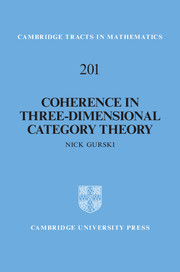Book contents
9 - Coherence via Yoneda
from Part II - Tricategories
Published online by Cambridge University Press: 05 April 2013
Summary
This chapter will prove that every tricategory is triequivalent to a Gray-category by a Yoneda-style argument. Such a proof proceeds in a number of steps. First, we must study functor tricategories. Second, we must produce a Yoneda embedding, and prove that it is actually an embedding. Finally, we must identify a sub-object of the target of the Yoneda embedding as the desired triequivalent Gray-category. In the case of coherence for bicategories, these were the only steps required; here we require one more initial step, namely that our tricategory T gets replaced by a cubical one.
The first goal is to establish the existence of a tricategory structure on the collection of functors, transformations, modifications, and perturbations between fixed source and target tricategories. We will not complete the full proofs here, but we will establish the complete local structure — for tricategories S, T and functors F, G : S → T between them, we construct the hom-bicategory Tricat(S, T)(F, G). The full tricategory Tricat(S, T) would require a number of additional calculations that we only choose to study in the case that T is a Gray-category. We thus show that if T is a Gray-category, the bicategory Tricat(S, T)(F, G) is actually a 2-category, and then go on to produce the remaining data for the tricategory Tricat(S, T) and show that the resulting tricategory structure is also a Gray-category.
- Type
- Chapter
- Information
- Coherence in Three-Dimensional Category Theory , pp. 138 - 155Publisher: Cambridge University PressPrint publication year: 2013

